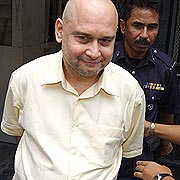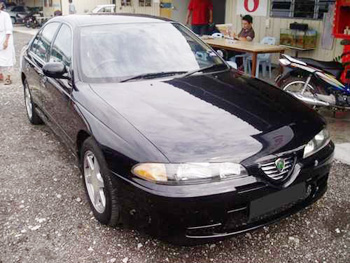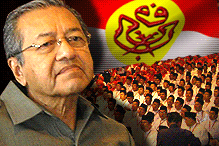In recent weeks, Malaysians have been witness to a dizzying roller-coaster ride of plots and counter-plots playing out in the public arena. Never before in our nation’s short history have we seen such an explosive electrifying bursts of political manoeuvres that have subterfuged our sacrosanct institutions of state to the very core.
Sitting in the eye of the storm is Anwar Ibrahim, poised for candidature in a much anticipated by-election to be held within 60 days or so, while promising a mass defection of MPs from the Barisan Nasional to the Pakatan Rakyat that would topple the BN federal government by September 16.
 Anwar is aided in no small way by the maverick one-man political commando, Raja Petra Kamarudin. With his blog, his statutory declarations, and his seemingly indomitable spirit of rebellion, Raja Petra has cast giant aspersion upon the character of people in the highest places and the moral credibility of the police with his astonishing revelations and expose. His claims are preposterous. But for a cynical citizenry, many people are not yet ready to dismiss him out of hand as a mad cap.
Anwar is aided in no small way by the maverick one-man political commando, Raja Petra Kamarudin. With his blog, his statutory declarations, and his seemingly indomitable spirit of rebellion, Raja Petra has cast giant aspersion upon the character of people in the highest places and the moral credibility of the police with his astonishing revelations and expose. His claims are preposterous. But for a cynical citizenry, many people are not yet ready to dismiss him out of hand as a mad cap.
The pronouncement that Umno and PAS have had a few secret meetings grabbed the headlines for weeks. The non-Malay and non-Muslim communities and the political parties that claim to represent them inside and outside BN were alarmed. The secret talks created tension not only in PAS and in Umno, but also within the BN and Pakatan alliances, introducing many potential variables within a murky political landscape.
Communal politics out
In the end, the talks fizzled out to nothingness. I should have said “I told you so”. There is too much bad history between these two Malay parties in past decades. Likewise, it would be well nigh impossible for the DAP and the MCA to merge into a new single party.
The collapse of the talk between Umno and PAS is good news for the future of Malaysian democracy. It does go to show that the old brand of communal politics that has dominated our national grand narrative for half a century is now losing its currency. The sooner this sort of communal politics reaches the end of its shelf life, the better it would be for justice for all Malaysians.
 Meanwhile, the mainstream media is stirring from their state of
rigour mortis,
after languishing in decades of deep freeze in the cesspool of press repression. The Pakatan state governments provide sufficient revelations about seedy wasteful abuses of public money under the previous BN state administration. Even a rogue BN state administration such as the one in Terengganu has unearthed the strange phenomenon of servicing official Proton Perdana cars at ridiculously high prices at both the state and federal levels.
Meanwhile, the mainstream media is stirring from their state of
rigour mortis,
after languishing in decades of deep freeze in the cesspool of press repression. The Pakatan state governments provide sufficient revelations about seedy wasteful abuses of public money under the previous BN state administration. Even a rogue BN state administration such as the one in Terengganu has unearthed the strange phenomenon of servicing official Proton Perdana cars at ridiculously high prices at both the state and federal levels.
This is followed by the revelation of the police buying RM100 millions’ worth of worthless equipment for use in the March 8 general election. Already bearing the yoke of public suspicion in investigating the allegations against Anwar Ibrahim, the police are now even more tied down by this latest round of very destructive assault on their moral credibility.
I must admit grudgingly that I begin to look forward to my morning newspapers again. You never know what to expect next. Politics and public discourses in the days and years ahead will certainly spring massive surprises that have never been visited upon the Malaysian soil before.
All these latest developments in the public sphere are very disturbing, baffling, and certainly worrisome to many people. Some even wonder aloud in public opinion pages of the newspapers if the army would be mobilised in the eventuality of great social upheavals. (This is a scenario that I cannot envisage at all.)
Very abnormal circumstances
Lately, there have been a string of commentaries lamenting what they consider to be a sorry state of affairs resulting from political madness on the part of our leaders. They should stop squabbling and start to work together to solve the problems facing the people, such as traffic congestion, inflation and the high oil prices, as well as public security. This obsession with power struggle merely betrays the mandate of the people given to our political leaders in the last elections. A perfect example of such a view is the column article entitled Mired in P olitical Madness by Veera Pandiyan that appeared in the Star on July 31.
His and other similar views would be valid under normal circumstances. What these commentators omit to observe is that we are living in a very abnormal stage in our nation’s history. Under abnormal circumstances, we ought to look beyond personalities and try to understand the forces at work that drive these personalities to do what they do.
We cannot conduct our political business as before because we are now perched on the fulcrum of a major shift in our political structure. We are living in a transitional phase with little precedents to guide us.
 In the past, things were predictable. Under the 22 years of Mahathirean rule, we believed wrongly that the BN had been divinely ordained to rule Malaysia till eternity. We believed that the opposition would always be weak and voiceless. We believed that newspapers would be closed down if they tried to be critical. Demonstrators would be detained under the dreaded ISA. We could predict political developments, and we took great prise in the certainty of our comfort zone. There was stability, the kind that you find behind bars.
In the past, things were predictable. Under the 22 years of Mahathirean rule, we believed wrongly that the BN had been divinely ordained to rule Malaysia till eternity. We believed that the opposition would always be weak and voiceless. We believed that newspapers would be closed down if they tried to be critical. Demonstrators would be detained under the dreaded ISA. We could predict political developments, and we took great prise in the certainty of our comfort zone. There was stability, the kind that you find behind bars.
On March 8, what we had believed to be immutable truths had turned out to be self-delusions overnight. The gridlock of political and social control that has been installed by a totalitarian autocratic regime for half a century suddenly collapsed. An old order has disappeared overnight, and a new order has yet to be established.
Whenever this happens, as in France in 1789, in the Philippines in 1986, in Indonesia in 1997, there is bound to be a transitional stage of confusion and uncertainty that people usually characterised as “political instability”.
This is a time when in Malaysia we can expect the political tectonic plates of power to jostle against one another to seek realignment in search of new political equations. The grinding together of tectonic plates is bound to produce big or small earthquakes once in a while.
There would be those who still cling on to old paradigms of modus operandi, and the MCA seemed bent on that path. But others such as the SAPP in Sabah would be exploring new alliances for the sake of either their survival or their ideology. Secret talks and conspiracies are the norms in these abnormal times.
Then again, political actors in both the BN and the Pakatan Rakyat find themselves in unfamiliar territories in this new landscape. Their various sorts of scheming are but tentative attempts to test these uncharted waters, with a view of gaining advantage for future gains. They would not be political leaders worth their salt if they do not!
Cultural shock
Then there are the political actors themselves who have to adapt themselves to changing realities. Opposition people who have shouted themselves hoarse for many decades in the political wilderness of Malaysia are now trying to behave like government figures. BN luminaries who have been used to the arrogance of power now find themselves in the new unfamiliar role of the opposition. The cultural shock these politicians go through will last for years.
So we are going through a transition from a totalitarian one-party state to a more democratic two-party system. The labour pain of the birth of true democracy can be excruciating. But the pain is necessary, because it may give birth to an open society and freedom for all citizens.
Some have blamed this intense politicking for our economic woes and the slump on our shares market. I beg to differ. What with high oil prices and the recession in the US, which country can boast of prosperity and high growth?
Where would all this political chicanery lead to? Nobody can tell for certain. But whatever politicians do as they see fit, thank God we have a government bureaucracy that still functions reasonably well on a day-to-day basis. We may not be happy with their delivery of government service all the time, but they do provide the bedrock of stability.
Then again, we have a pretty solid citizenry, especially the large silent street-wise middle class in the urban and suburban parts of the country. They watch the political intrigues unfolding before their eyes coldly and calmly, making their individual mind about the right and wrong of things, and perhaps waiting for the next general election.
They are the reasons why real political stability is in place firmly in Malaysia!

